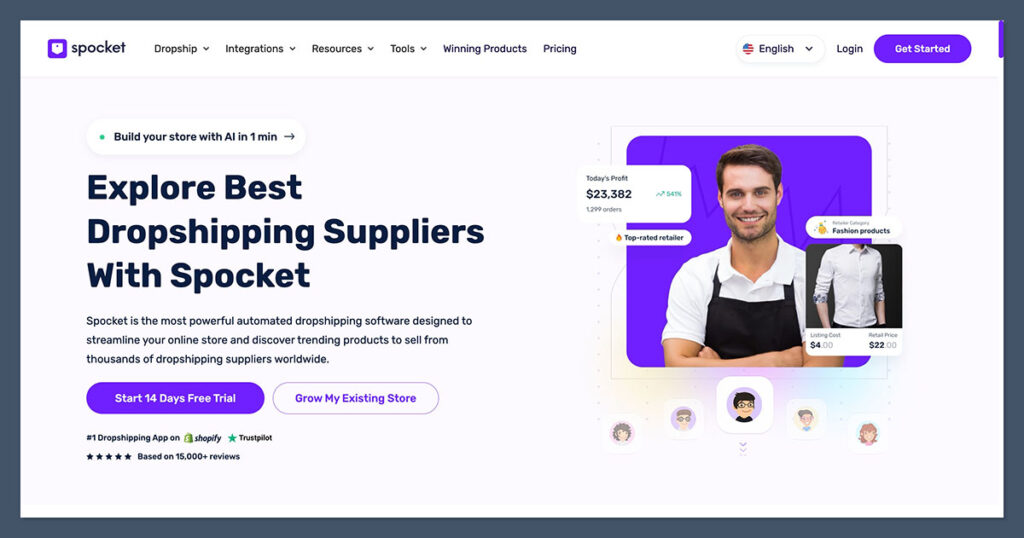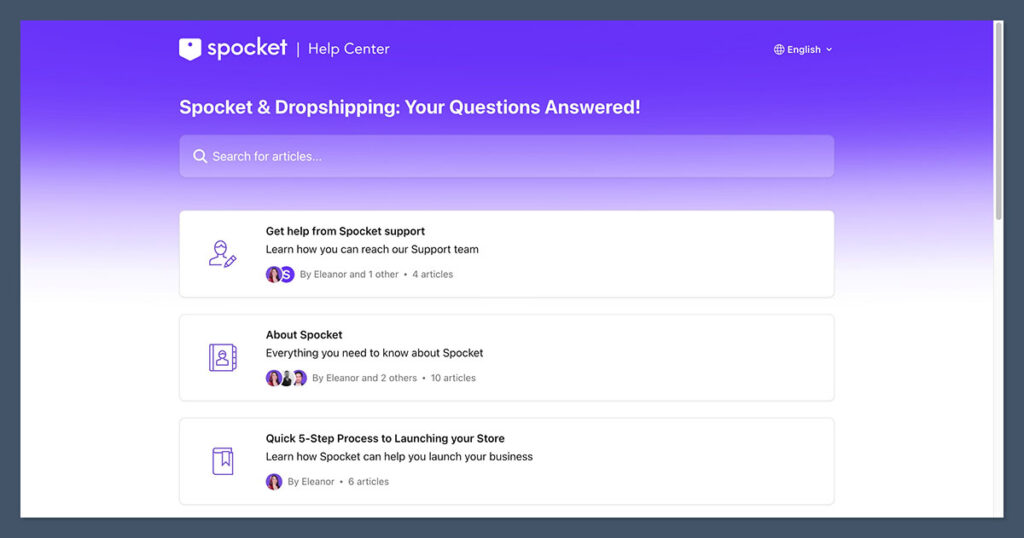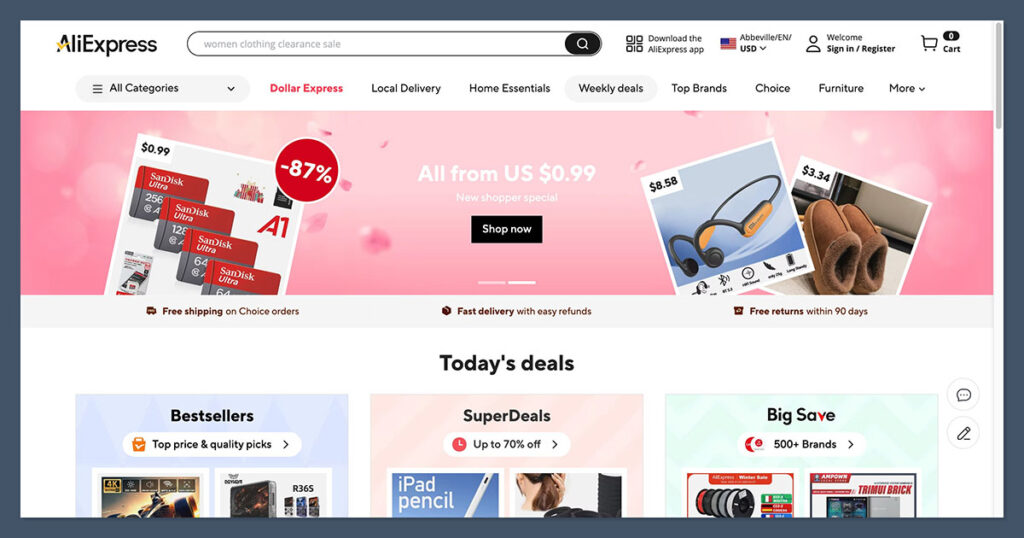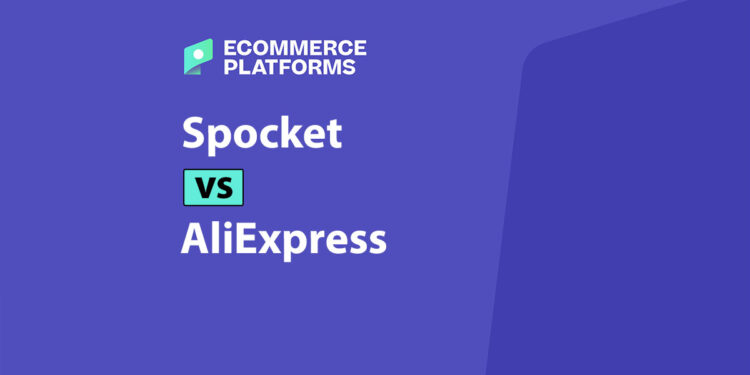Spocket and AliExpress are two of the biggest names in the dropshipping space—but which one’s better for your store?
I’ve spent weeks comparing both platforms side-by-side, testing how they perform in real stores across product quality, shipping times, automation, pricing, branding, and overall ease of use.
Here’s what I found: Spocket is the better option if you’re serious about building a long-term ecommerce business.
AliExpress, however, still has a place if you’re just starting out or want to test new product ideas with minimal upfront cost.
Let’s take a closer look.
Quick Verdict: Spocket vs AliExpress
Spocket – Best for established stores focused on fast shipping, high-quality products, and brand experience
AliExpress – Best for beginners or budget-conscious sellers testing products
Both platforms support dropshipping, but they go about it in very different ways.
Spocket vs AliExpress: At a Glance
| Feature | Spocket | AliExpress |
|---|---|---|
| Shipping Time | 2–7 days (US/EU suppliers) | 15–45 days (China-based sellers) |
| Product Quality | Vetted, consistent | Inconsistent |
| Pricing | $39.99–$99.99/mo | Free to use |
| Branded Invoicing | Yes | No |
| Returns & Support | Platform-backed support | Seller-dependent |
| Ideal For | Branding, premium positioning | Testing, volume-first stores |
Best for Product Quality and Delivery: Spocket


Fast shipping and product quality are critical in ecommerce.
Both platforms offer a wide range of products, but Spocket clearly outperforms AliExpress when it comes to consistency and customer experience.
Shipping Speed
Spocket’s suppliers are located mainly in the US and Europe, which drastically reduces shipping times. Most customers receive their orders in 2 to 7 business days.
AliExpress sellers are based mostly in China. Even with ePacket or AliExpress Standard Shipping, orders typically take 15 to 45 days to arrive.
For customer satisfaction, delivery time matters. Faster shipping leads to fewer complaints, better reviews, and higher repeat order rates.
Product Quality
AliExpress has millions of products—but not all are created equal. Sellers vary in reliability and quality control. It’s common to receive items that look different from the photos or are poorly made.
Spocket, by contrast, works with a curated network of suppliers. Each supplier goes through a vetting process before being listed on the platform, which increases the odds of receiving consistent products.
Return Rates
- AliExpress: Average return rate ~14% (due to delays, poor quality, incorrect items)
- Spocket: Average return rate ~6% (higher product standards and faster delivery)
Winner: Spocket
If you’re targeting US customers and want fewer returns and faster delivery, Spocket is the clear choice.
Best for Pricing and Profit Margins: Tie
At first glance, AliExpress seems more affordable, but there’s more to consider than just product price.
Pricing Structures
AliExpress is free to use. You pay only for the products you sell.
Spocket charges a monthly subscription fee:
- Starter (Free): Limited product access
- Pro Plan: $39.99/month
- Empire Plan: $99.99/month
Product Costs and Margins
- AliExpress: Products are cheaper upfront, often priced under $10
- Spocket: Products are higher quality and higher priced, usually between $10–$30
Here’s the trade-off:
- AliExpress offers lower product costs but also lower perceived value
- Spocket allows higher markups, meaning you can price products at $50–$100 and still look credible
If you’re selling to bargain-hunters or running ads with a low budget, AliExpress works. But if you’re trying to increase average order value and brand trust, Spocket’s higher product cost pays off.
Pricing Comparison Table
| Platform | Monthly Fee | Avg Product Cost | Avg Retail Price | Transaction Fees |
|---|---|---|---|---|
| AliExpress | Free | $2–$10 | $15–$30 | Varies by gateway |
| Spocket | $39.99–$99.99/mo | $10–$30 | $30–$100 | Varies by gateway |
Winner: Tie
AliExpress wins on cost, but Spocket gives you better margin potential for brand-driven businesses.
Best for Branding and Customer Experience: Spocket
Branding is where Spocket clearly leads. While AliExpress gets the job done for fulfillment, it’s very limited when it comes to how your store presents itself.
Branded Invoicing and Packaging
Spocket allows you to:
AliExpress doesn’t offer any branding unless you contact the seller directly and negotiate custom packaging—usually with bulk orders, which defeats the purpose of dropshipping.
Customer Experience
With Spocket, you can create a cleaner, more Amazon-like experience:
- Fast delivery
- Clear tracking numbers
- Consistent product presentation
AliExpress customers often receive generic packages with Chinese labels. Some packages contain promotional materials from the supplier, which can lead to customers discovering the product’s true source and price.
Refunds and Disputes
- Spocket provides a resolution system to mediate supplier issues
- AliExpress disputes go through the platform’s buyer protection process, which can take weeks
Winner: Spocket
If customer satisfaction and brand image matter to your business, Spocket gives you more tools to deliver a better experience.
Best for Automation and Integration: Spocket
Managing product syncing, inventory, and order fulfillment manually isn’t sustainable long-term. Both platforms support automation, but the setup and experience vary significantly.
Integration Options
AliExpress requires third-party tools like:
These tools automate product imports, pricing, inventory sync, and auto-ordering—but they require extra steps and often cost money themselves.
Spocket comes with native integrations for:
- Shopify
- WooCommerce
- BigCommerce
- Wix
- Squarespace
No extensions needed. Everything’s managed in the Spocket dashboard.
Features You Get With Spocket
- One-click product import
- Real-time inventory updates
- Auto-ordering
- Order tracking
- Branded invoicing
The built-in features make Spocket more user-friendly, especially for newer store owners.
Winner: Spocket
Spocket’s all-in-one dashboard is easier to manage, with better automation out of the box.
Best for Supplier Relationships and Support: Spocket


Good supplier relationships are the backbone of a reliable dropshipping operation.
AliExpress: Marketplace Model
With AliExpress, you’re working with individual sellers. There’s no guarantee of long-term reliability or communication. Time zones, language barriers, and unresponsive sellers are common pain points.
If you have an issue with an order, you must contact the seller directly, and there’s no platform-level support unless you escalate through AliExpress’s dispute system.
Spocket: Curated Supplier Network
Spocket carefully vets suppliers before listing them. Each supplier must meet certain performance standards, and Spocket steps in when issues arise.
Support is handled directly through:
- In-app live chat
- Email support
- A dedicated resolution process
Having the platform as an intermediary is a huge advantage.
Winner: Spocket
If reliability and responsive support are important, Spocket provides a better structure.
Best for Product Range: AliExpress


AliExpress offers millions of products across every category you can imagine. This makes it a great tool for quickly testing new product ideas or running general stores.
Spocket has a much smaller catalog, focused mainly on:
- Home & garden
- Fashion & accessories
- Tech gadgets
- Pet supplies
While the product count is smaller, the trade-off is quality and consistency.
Here’s a quick comparison:
| Platform | Product Volume | Supplier Type | Best For |
|---|---|---|---|
| AliExpress | Millions | Unvetted sellers | General stores, testing |
| Spocket | ~50,000+ curated | Vetted suppliers | Niche and branded stores |
Winner: AliExpress
AliExpress wins in volume, which is great for testing—but quality is hit-or-miss.
Best for Beginners: AliExpress
If you’re new to ecommerce and want to launch without spending much, AliExpress is an easy way to start.
There’s no subscription fee, and you can test products with minimal risk. Platforms like DSers and AutoDS make it easy to get started.
However, you’ll need to accept:
- Longer shipping times
- Lower quality control
- No branding
If you’re just validating product ideas, this can work well.
If you’re a beginner who’s already committed to building a long-term brand, Spocket is still worth considering.
While it comes with a monthly fee, the built-in automation, vetted suppliers, and fast US shipping can help eliminate the headaches many first-timers face with AliExpress—like refund requests, customer complaints, and tracking issues. It’s a smoother way to start if you have a bit more budget and want to avoid common early-stage pitfalls.
Winner: AliExpress
Ideal for low-cost testing and first-time store owners.
Final Verdict: Spocket Wins for Serious Brands
If you’re building a long-term ecommerce brand, Spocket is the better choice. Its fast shipping, vetted suppliers, automation, and branding features give you everything you need to scale.
That said, AliExpress still has a role, especially if you’re testing new niches or want to experiment without monthly costs.
Spocket Is Best For:
- Building a premium brand
- Faster shipping in the US and EU
- Reducing refunds and complaints
- Scaling customer satisfaction
AliExpress Is Best For:
- Testing new product ideas
- Starting on a tight budget
- Selling low-cost, high-volume items
- Launching general stores
Try Both Before You Commit
Both platforms offer free access (or free trials), so you can test each and see what fits best with your business model.
- Spocket Free Trial: Available with limited product access
- AliExpress: No signup required, but consider using DSers or AutoDS for automation
Ultimately, the best platform depends on your goals.
If customer experience and branding matter most, go with Spocket. If speed and low-cost testing are your priorities, AliExpress might be enough to get started.






